Panhandlers: Councilwoman Moses & Com. Witt Want to Throw Tens of Thousands $ Without Data
Posted November 4, 2019 01:42 pm | (1 comment)
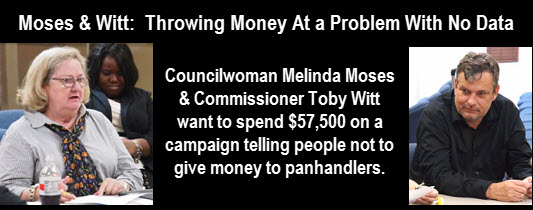
The initial $57,500 appears to have been
reduced. There is supposed be a more solid
number at the next meeting.
 COLUMBIA COUNTY/LAKE CITY, FL – Last
Thursday, the United Way Homeless Coalition
subcommittee met to discuss an advertising
campaign to discourage people in Columbia County
from giving money to panhandlers (and the
homeless). The elected government
representatives on this committee are Lake City
Councilwoman Melinda Moses and member of the
County 5, Toby Witt.
COLUMBIA COUNTY/LAKE CITY, FL – Last
Thursday, the United Way Homeless Coalition
subcommittee met to discuss an advertising
campaign to discourage people in Columbia County
from giving money to panhandlers (and the
homeless). The elected government
representatives on this committee are Lake City
Councilwoman Melinda Moses and member of the
County 5, Toby Witt.
Background
For some time people have been complaining about panhandling at the I-75, U.S. 90 off ramp.
In January of this year, the Florida Department of Transportation (FDOT) told the Tourist Development Council (TDC) that re-landscaping the interchange would take from 2 to 5 years.
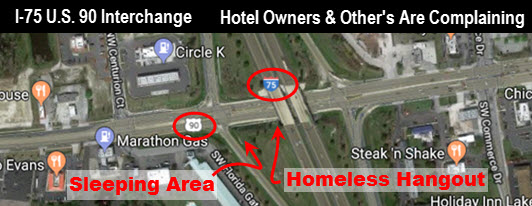
See:
County Hotel Owners Complain About Homeless
Under the Interstate at U.S. 90 – FDOT to
Step In
FDOT completed the project within months. Since that time there has been no effort on the part of United Way, the County, or the City to determine the effectiveness of the project on the "panhandling" problem.
The Subcommittee
On October 31, at 3 pm, the Homeless Coalition Subcommittee met. Besides Ms. Moses and Mr. Witt, committee members in attendance were LCPD Chief Gilmore, Assistant State Attorney John Durrett, representing the State Attorney, City Manager Joe Helfenberger, City Clerk Audrey Sikes, County Administrative Assistant Ester Chung, and Executive Director Jennifer Anchors of Suwannee Valley United Way and two of her staff members.
Chamber of Commerce Exec. Director Teresa Pinto was also in attendance. It is not clear if she is a member of the subcommittee.
Ms. Anchors did not present a meeting agenda, nor did she provide minutes from the last meeting.
New County Ordinance On the Way
A new County Ordinance purported to inhibit panhandlers and the people that give them money is on the County 5 docket for this coming Thursday evening.
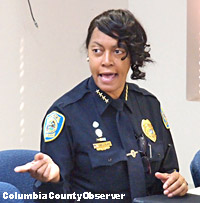
LCPD Chief Argatha Gilmore makes a point during
the meeting./p>
Chief Gilmore was excited that the State Attorney's Office was at the table. She said, "[the County] tried to make it a safety ordinance." She added she was "not sure if it had enough teeth."
The Chief continued, "For us, if it is going to have any teeth, depends on if there will be any prostitution [sic] that comes out of it for the State Attorney's Office... that's why we have a state attorney at the table to guide us through this; insure no constitutional rights are violated and everything is good."
Ms. Pinto asked if private business can keep panhandlers off their property.
Chief Gilmore explained that the business owner needs to "issue a trespass warning that we do not want this person on our property doing this, there is nothing that we can do about that."
Chief Gilmore explained that the ordinance only concerns "publicly owned property."
State Attorney Weighs In
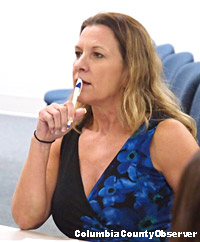
United Way's Executive Director Jennifer Anchors
chaired the meeting. She gave everyone a chance
to speak.
Sitting in for State Attorney Jeff Siegmeister was Assistant State Attorney (ASA) John Durrett.
He joined the conversation, "I'm not the County Attorney. I'm not the City Attorney. I'm a prosecutor. I cannot step out from behind that shield and give you advice on anything."
Ms. Pinto asked about "trespassing people from a private parking lot."
ASA Durrett said, "You can trespass whoever you want from your own personal property."
Commissioner Witt opined that the public needs to be educated.
Chief Gilmore said, "The police need to be called."
Ms. Moses asked if the person has to be named. It was not clear what person she was talking about.
Chief Gilmore replied, "We have had it where it was a blanket trespass warning."
No one explained a "blanket trespass warning."
Ms. Pinto gave her take on the problem with panhandlers. "Unfortunately, they're out on the side walk or they walk around the parking lot."
Commissioner Witt jumped in, "When they hit the parking lot, you can trespass em'."
Marketing Campaign and then "These or Those?"
Ms. Anchors said, "That could be part of the marketing campaign. Teaching business owners what their rights are and what they are able to do."
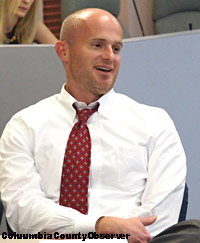
ASA John Durrett represented State Attorney Jeff
Siegmeister at the meeting.
Ms. Anchors addressed ASA Durrett, "John, if the City Attorney and the County Attorney implement an ordinance, will the State Attorney's Office prosecute?"
Mr. Durrett answered, "That's Jeff's [State Attorney Siegmeister] decision to make, not mine. It's his name on the door. He's the one -- there would have to be a contract entered into between him and the municipality. I can't speak for him."
Mr. Durrett continued, "Personal opinion, you know the idea of prosecuting someone who is passing through Lake City and stopping to get gas off the interstate that interacted with someone that feels as though they are doing something kind - I have no desire to do that. But that's not my decision to make... if you are going to prosecute those, is it going to extend to the firemen in front of Hardees? We're comfortable giving our money to these, but not to those."
Chief Gilmore said the City could give the firemen a permit.
In order for the City to give tickets to panhandlers, it would have to pass its own panhandling ordinance. The talk was that it would mirror the County ordinance. That ordinance is on the agenda for this Thursday's meeting of the County 5.
Commissioner Witt said, "That if an ordinance is passed, it would give law enforcement a tool to tell people they can't go out into traffic and ask for money."
Chief Gilmore said this would give the police a tool to keep folks off the ramps where "people come into our City."
It was not clear if panhandlers would be arrested, given a warning, given an appearance ticket, or if they were actually panhandlers or homeless, with no money, how they would pay the fine.
Chief Gilmore asked, "Who is going to make them pay?"
Chief Gilmore pointed out that Gainesville passed a similar ordinance to that coming before The 5 this Thursday and suggested that the folks from Gainesville be invited to a meeting so Columbia County could find out how the ordinance is working out."
The folks in Gainesville did not pass an ordinance, the Alachua County Commission passed the ordinance.
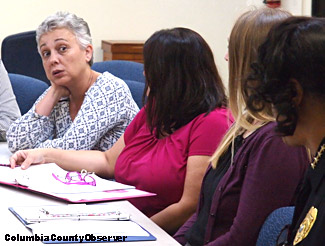
Chamber Exec. Dir. Teresa Pinto listens to Chief
Gilmore.
Ms. Pinto shared her thoughts, telling the group that if people saw a sign saying that 'Panhandling is not accepted,' that would go a long way toward perception."
Chief Gilmore circled back to the marketing plan, "We need to come out with a strong marketing plan. We need to get out there and educate our community. We just might see a decline."
A marketing proposal was presented. The annual cost was $57,500. It was called the "Homeless Awareness Marketing Campaign" and included such things as advertising on Facebook, Twitter, making a movie, printing flyers, advertising on billboards (estimated cost $25,200 per year), public service announcements, and advertising on the radio.
Ms. Anchors explained the campaign: "This is a multi-prong approach to educate-build awareness, and inform the community of the difference between panhandling and homelessness."
City Manager Joe Helfenberger asked, "Is anyone aware of communities that have successfully done this type of campaign?"
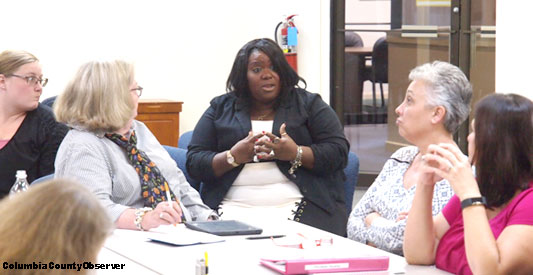
A surprise guest from Valdosta, homeless
advocate Lisa Rene Straughter, who explained
that she was once homeless, caught everyone's
attention with her advice.
A staff member of United Way said she had "spent quite a lot of time looking into it." She said she couldn't find statistics and the results "had not been tracked very well... I have not been able to find a whole lot on it."
Your reporter asked, "How does this help the homeless or the panhandlers? Are you advertising so that people don't give money to them? For $60,000 you could buy everybody a bus ticket and send them to Alachua."
Commissioner Witt said, "This is specific to panhandling. If you can stop people from giving them cash then the problem decreases. The only tool we have to do this is a public service campaign and that costs money."
Your reporter followed up, "Has anybody done a statistical analysis of how many panhandlers are at the interstate?"
Commissioner Witt said, "They are still there today."
Your reporter asked, "How many?
Commissioner Witt: "Like 5."
Your reporter followed up, "So you're going to spend $60k for 5?"
The Chamber of Commerce's Pinto said, "You have to start somewhere."
The Little Cards
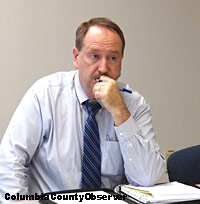
Lake City's unflappable City Manager Joe
Helfenberger listens to the conversation.
It was pointed out that the panhandlers are given a card with services available.
Your reporter asked, "What are they supposed to do then?"
Councilwoman Moses answered, "Get in touch with all the services that are afforded to them."
Your reporter followed up, "Do they do that? You've been doing this for some time with these cards.
No one from United Way knew how many referrals were a result of handing out the little cards.
After some discussion about the marketing budget, which appeared to have been reduced, Ms. Anchors said she could now go to Manta [the owner of the Advertiser].
Ms. Pinto suggested going to big donors like Nutrien and Weyerhaeuser. "These organizations have a stake," she said.
Ms. Pinto added, "I'm not beyond going into the TDC."
Commissioner Witt: "Oh Lord."
Councilwoman Moses: "Oh Lord."
Ms. Pinto opined, "I think that if it's a concern for the hospitality sector, I don't think it's a bad use of their monies."
It does not appear that there is a Florida law that gives the TDC authority to give TDC funds to educate Columbia County residents on the pros and cons of giving money to panhandlers and the homeless.
As the meeting was winding down, your reporter asked, "Since DOT did all the landscaping work at the interstate, has the issue of the panhandlers or homeless there increased or decreased?
Ms. Pinto jumped in, "I can tell you that I no longer see the amount of trash, shopping carts, the garbage and the people."
Your reporter followed up, "Besides you, has the government, United Way, or any of these organizations whose money you want to spend or give money to, has there been any sort of reconciliation since that has been done."
After a brief silence your reporter said, "Nobody's keeping track. Is that the case?
No one answered the question. It is the case.
Epilogue: "You have to have the data."
After the meeting the Observer asked City Manager Helfenberger if he thought the City should make a contribution to the marketing plan.
City Manager Helfenberger answered, "I like to see factual data that shows the effectiveness of programs like these - programs that are going on elsewhere. You have to have the data."
